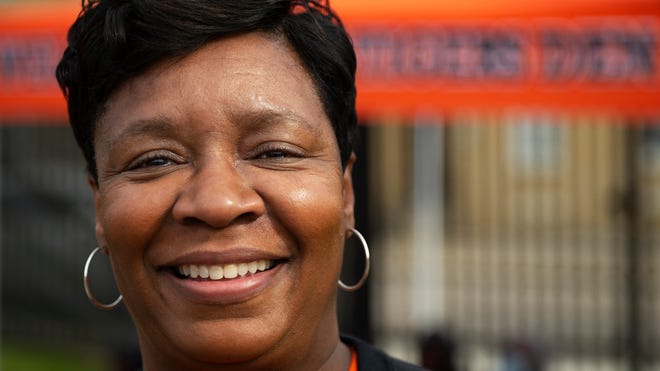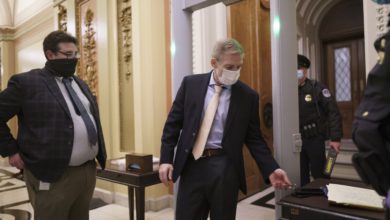WASHINGTON – After a whirlwind week of negotiations between Democrats trying to enact two central pieces of President Joe Biden's agenda, the White House and congressional leaders are doubling down on their commitment to pass the bills amid intra-party conflict.
"I believe I can get this done," Biden told a crowd of reporters on Saturday before boarding a flight on Marine One to Wilmington, Delaware. "I believe, when the American people are aware of what's in it, we can get it done."
House Speaker Nancy Pelosi, D-Calif., delayed a vote on a bipartisan infrastructure agreement passed in the Senate after it became clear that leadership couldn't muster the votes for the bill to succeed amid debate over a much larger package that would expand the nation's social safety net.
“Clearly, the bipartisan infrastructure bill will pass once we have agreement on the reconciliation bill," Pelosi said in a letter to colleagues on Saturday morning, while cautioning that "more time was needed to reach our goal of passing both bills, which we will."
A lack of trust between moderate and progressive factions in the party has forced Biden, Pelosi and Senate Majority Leader Chuck Schumer, D-N.Y., to engage in a careful balancing act to ensure that the party delivers on its promised legislation.
The tense discussions and uncertainty surrounding the process have mounted pressure on Biden especially, who campaigned on a promise to show that democracy and government can deliver results. As party leaders redouble their efforts to enact his agenda, the Biden administration is betting it all that he can follow through.
Talks stall as deadlines pass
Several hold-out moderate House Democrats, as well as Sens. Joe Manchin, D-W. Va., and Kristin Sinema, D-Ariz., had pushed for a vote on the infrastructure bill by Sep. 27, arguing it is a good bill that should be passed immediately.
Progressive House Democrats, meanwhile, said they wouldn't support an infrastructure vote unless it was clear that the party's other priority legislation, a social spending package last billed at $3.5 trillion over a decade, would also be guaranteed to pass both chambers.
In early September, Pelosi brokered an agreement that promised a vote on infrastructure by that date while also passing a motion to begin crafting a larger reconciliation bill.
Congress successfully avoided a government shutdown on Thursday by passing a resolution to fund the federal government through December.
The Senate also cleared a short-term extension of the federal highway program Saturday and sent it to Biden for his signature. The highway program expired Thursday at midnight, for lack of approval of the bipartisan infrastructure bill. The Transportation Department said about 3,700 workers were furloughed Friday. The Senate approved the 30-day extension by unanimous consent.
White House digs in on negotiations
The White House was gearing up for another round of negotiations, and Biden himself is expected to wade further into talks this coming week, wooing lawmakers and acting as a peacemaker in the party.
Biden has been clear about the poor mood among many legislators at the moment as well but argued it was a part of the process.
“Everybody is frustrated. That's part of government, being frustrated," Biden said on the South Lawn of the White House.
On Friday evening, Biden projected similar confidence while leaving a huddle of House Democrats on Capitol Hill.
“It doesn't matter whether it's in six minutes, six days, or in six weeks. We're going to get it done,” he told a gathered group of reporters.
Biden left that meeting "with the firm belief that there was a shared commitment from across the Democratic Caucus to deliver for the American people," White House press secretary Jen Psaki said in a Saturday morning statement.
Psaki added the White House is continuing negotiations with lawmakers in both chambers of Congress through the weekend. Biden, who will again host lawmakers for talks at the White House in the coming week, is taking his pitch for the two bills on the road, according to the White House.
The White House expects the next round of negotiations to further shrink the scope of the budget reconciliation measure, a process that will be hard to stomach for many progressives and the White House itself.
"It's clear, as numbers come down, which they will, that there will be cuts to different components," Psaki said Thursday. "That's just the nature of the totals here. But we'll leave those conversations private."
Manchin, a pivotal Senate vote, revealed last week that he was only comfortable with a reconciliation package of $1.5 trillion, far short of what most in the party support. The new threshold has forced Biden aides and lawmakers to grapple with what provisions to cut.
Moderates fume over infrastructure vote
Pelosi's decision to delay a vote on the infrastructure bill has been lambasted by moderates in both chambers of Congress.
On Saturday, Sinema called the delay an "inexcusable, and deeply disappointing for communities across our country."
She further called progressive's actions an “ineffective stunt to gain leverage over a separate proposal” that “betrays the trust the American people have placed" in Congress.
Rep. Josh Gottheimer, D-N.J., who has led a group of nine House Democrats in talks with Pelosi over passing the bill, argued that "a small far-left faction" of Democrats "blocked a critical vote" on part of Biden's agenda.
"This far left faction is willing to put the President’s entire agenda, including this historic bipartisan infrastructure package, at risk," Gottheimer wrote. "They’ve put civility and bipartisan governing at risk."
Rep. Stephanie Murphy, D-Fla., criticized a "misguided effort" by progressives "to vote against a very good infrastructure bill. I hope my colleagues will reconsider their approach."
Murphy added that she supports a reconciliation package that is "bold," "fiscally disciplined" and that prioritizes climate change. "There is no – zero – linkage between these two bills in my mind," she continued.
Progressives feeling momentum
After successfully delaying a vote on the infrastructure bill, progressives are gearing up to keep as many of their priorities in the larger social spending package. Feeling momentum, several progressive lawmakers have expressed confidence ahead of the next round of talks.
“Out of respect for our colleagues who support the bills and out of recognition for the need for both, I would not bring(tnfrastructure bill) to the floor to fail," Pelosi wrote in her letter to members.
"We are at the table to try and deliver both things, and I believe that we will," said Rep. Pramila Jayapal, D-Wash., chair of the Progressive House Caucus, on Thursday evening.
Progressives are further painting themselves as defenders of Biden's agenda, arguing the majority of his promises are tied to the larger reconciliation package.
"If we pass the infrastructure bill alone, we are not even accomplishing 10% of his agenda," Rep. Ilhan Omar, D-Minn., said Thursday. "The majority of the agenda that the president ran on that delivered us the House, the Senate and the White House is in the Build Back Better agenda. If we fail to deliver on that promise, we have failed the American people.
Follow Matthew Brown online @mrbrownsir.










